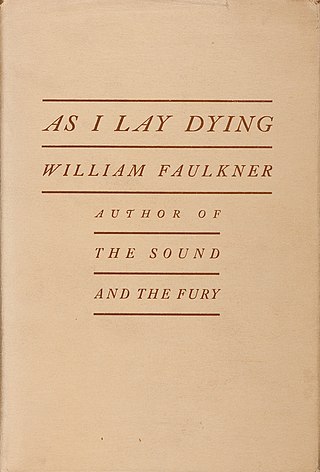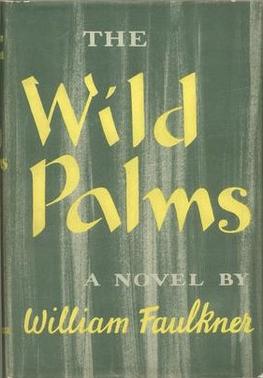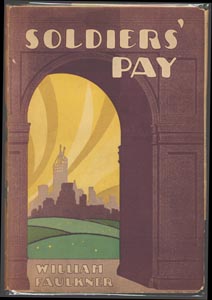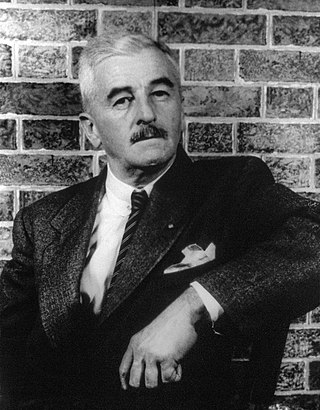Related Research Articles

William Cuthbert Faulkner was an American writer known for his novels and short stories set in the fictional Yoknapatawpha County, based on Lafayette County, Mississippi, where Faulkner spent most of his life. A Nobel laureate, Faulkner is one of the most celebrated writers of American literature and often is considered the greatest writer of Southern literature.

Light in August is a 1932 novel by the Southern American author William Faulkner. It belongs to the Southern gothic and modernist literary genres.

The Sound and the Fury is a novel by the American author William Faulkner. It employs several narrative styles, including stream of consciousness. Published in 1929, The Sound and the Fury was Faulkner's fourth novel, and was not immediately successful. In 1931, however, when Faulkner's sixth novel, Sanctuary, was published—a sensationalist story, which Faulkner later said was written only for money—The Sound and the Fury also became commercially successful, and Faulkner began to receive critical attention.

As I Lay Dying is a 1930 Southern Gothic novel by American author William Faulkner. Faulkner's fifth novel, it is consistently ranked among the best novels of the 20th century. The title is derived from William Marris's 1925 translation of Homer's Odyssey, referring to the similar themes of both works.

If I Forget Thee, Jerusalem is a novel by the American author William Faulkner published in 1939. The novel was originally published under the title The Wild Palms, which is the title of one of the two interwoven stories. This title was chosen by the publishers, Random House, over the objections of Faulkner's choice of a title. Subsequent editions have since been printed under the title If I Forget Thee Jerusalem, and since 2003 it is now usually referred to by both names, with the newer title following the historically first published title and in brackets, to avoid confusion: The Wild Palms [If I Forget Thee, Jerusalem].

Intruder in the Dust is a 1948 crime novel written by American author William Faulkner. Taking place in Mississippi, it revolves around an African American farmer accused of murdering a Caucasian man.
"That Evening Sun" is a short story by the American author William Faulkner, published in 1931 in the collection These 13, which included Faulkner's most anthologized story, "A Rose for Emily". The story was originally published, in a slightly different form, as "That Evening Sun Go Down" in The American Mercury in March of the same year.

Rowan Oak was the home of author William Faulkner in Oxford, Mississippi. It is a primitive Greek Revival house built in the 1840s by Colonel Robert Sheegog, an Irish immigrant planter from Tennessee. Faulkner purchased the house when it was in disrepair in 1930 and did many of the renovations himself. Other renovations were done in the 1950s. One of its more famous features is the outline of Faulkner's Pulitzer Prize–winning novel A Fable, penciled in graphite and red on the plaster walls of his office. It is now owned and operated by the University of Mississippi as a museum, and is open to visitors year-round.
To Have and Have Not is a 1944 American romantic war adventure film directed by Howard Hawks, loosely based on Ernest Hemingway's 1937 novel of the same name. It stars Humphrey Bogart, Walter Brennan and Lauren Bacall; it also features Dolores Moran, Hoagy Carmichael, Sheldon Leonard, Dan Seymour, and Marcel Dalio. The plot, centered on the romance between a freelancing fisherman in Martinique and a beautiful American drifter, is complicated by the growing French resistance in Vichy France.

A Fable is a 1954 novel written by the American author William Faulkner. He spent more than a decade and tremendous effort on it, and aspired for it to be "the best work of my life and maybe of my time". It won the Pulitzer Prize and the National Book Award. Historically, it can be seen as a precursor to Joseph Heller's Catch-22.

"A Rose for Emily" is a short story by American author William Faulkner, first published on April 30, 1930, in an issue of The Forum. The story takes place in Faulkner's fictional Jefferson, Mississippi, in the equally fictional county of Yoknapatawpha. It was Faulkner's first short story published in a national magazine.
"Barn Burning" is a short story by the American author William Faulkner which first appeared in Harper's in June 1939 (pp. 86–96) and has since been widely anthologized. The story deals with class conflicts, the influence of fathers, and vengeance as viewed through the third-person perspective of a young, impressionable child. It precedes The Hamlet, The Town, and The Mansion, the three novels that make up Faulkner's Snopes trilogy.

Requiem for a Nun is a work of fiction written by William Faulkner. It is a sequel to Faulkner's early novel Sanctuary, which introduced the characters of Temple Drake, her friend Gowan Stevens, and Gowan's uncle Gavin Stevens. The events in Requiem are set in Faulkner's fictional Yoknapatawpha County and Jackson, Mississippi, in November 1937 and March 1938, eight years after the events of Sanctuary. In Requiem, Temple, now married with a child, must learn to deal with her violent, turbulent past as related in Sanctuary.

Soldiers' Pay is the first novel published by the American author William Faulkner. It was originally published by Boni & Liveright on February 25, 1926. It is unclear if Soldiers' Pay is the first novel written by Faulkner. It is however the first novel published by the author. Faulkner was working on two manuscripts while finishing Soldiers' Pay.
"Red Leaves" is a short story by American author William Faulkner. First published in the Saturday Evening Post on October 25, 1930, it was one of Faulkner's first stories to appear in a national magazine. The next year the story was included in These 13, Faulkner's first collection of short stories.
Viola Sachs was a Professor of American Literature at "Université de Paris VIII, France".
"Landing in Luck" was William Faulkner's first published short story. Appearing in the November 26, 1919 issue of The Mississippian, a literary magazine at the University of Mississippi, "Landing in Luck" tells the story of Cadet Thompson, who is sent on a solo flight without adequate instruction. Thompson lands successfully, and his flight instructor, Bessing, takes credit for the fine job he did of teaching the cadet pilot. It is a fictional exaggeration based on Faulkner's experience as a cadet-pilot for the Royal Air Force (RAF) in 1918.

William Faulkner (1897—1962) was an American writer who won the 1949 Nobel Prize in Literature. He is best known for his novels and short stories set in the fictional Yoknapatawpha County, a stand-in for his hometown of Oxford in Lafayette County, Mississippi.

The 1949 Nobel Prize in Literature was awarded the American author William Faulkner (1897–1962) "for his powerful and artistically unique contribution to the modern American novel." The prize was awarded the following year on October 1950. The Nobel Committee for Literature had decided that none of the nominations for 1949 met the criteria as outlined in the will of Alfred Nobel, and the prize was reserved until the following year.

Jean Jamin was a French ethnologist and anthropologist. Director of studies at the School for Advanced Studies in the Social Sciences, he taught ethnology there from 1993 to 2016. He directed the journal L'Homme from 1996 to 2015 and co-founded the journal Gradhiva in 1986 alongside Michel Leiris. In the mid-1990s, he became a specialist in the study of the relationship between anthropology and literature, as well as between opera, jazz, popular music, and folk music.
References
- Kirk, Robert W.; Klotz, Marvin (1965). Faulkner's People: A complete guide and index to the characters and fiction of William Faulkner. Los Angeles: University of California Press.